Search Images
Browse Content (p. 1607)
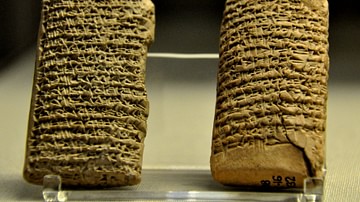
Image
Demand for Tablets for the Libary of Ashurbanipal
Two almost similar letter tablets relaying the Assyrian king Ashurbanipal's orders to his employees to find local copies of particular compositions, which the royal library at Nineveh lacked. Sent from Nineveh and found at the city of Borsippa...
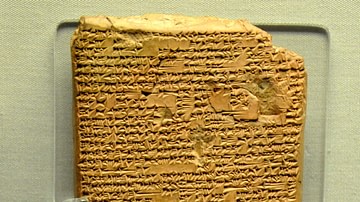
Image
Ishtar's Descent into the Underworld Inscription
This large and partially broken clay tablet tells us how Ishtar, goddess of love and war, decided to descend and enter the underworld. During her long journey, she was gradually stripped of her attributes, therefore, she lost all of her...
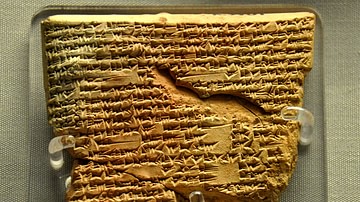
Image
Inscription of the Birth of King Sargon of Akkad
This fragment of a clay tablet narrates in 17 lines of cuneiform inscription the origin of Sargon and recounts how as a baby he was found in a basket floating in a river. Sargon reigned from 2334-2279 BCE. From the library of Ashurbanipal...
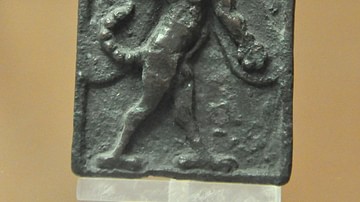
Image
Pazuzu Amulet
A copper-alloy amulet of Pazuzu; the king of the demons of the wind. He has a human body, 4 wings, lion forepaws, vulture's feet, and rattle snake tail. Pazuzu is often depicted with his right hand pointing upward and left hand pointing downward...
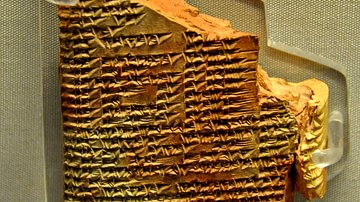
Image
Legend of the Hero Etana Inscription
This is the 4th tablet of the story of Etana, which tells us how Etana was carried to Heaven on the back of an eagle. Etana did this long journey in order to find the plant of birth. He was a Sumerian king of Kish. This story is one of the...
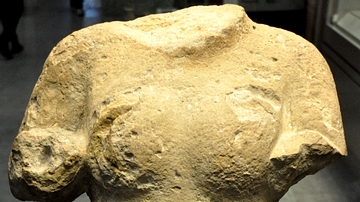
Image
Statue of a Naked Woman from Nineveh
This limestone statue is the only discovered statue which depicts a completely naked woman. It is very likely that the statue represents an attendant of goddess Ishtar or Ishtar herself in her role as a goddess of love. The cuneiform inscriptions...
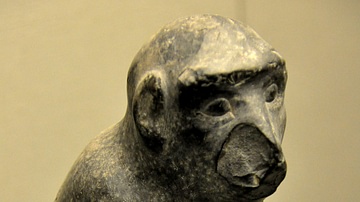
Image
Statue of a Monkey from Kar Tukulti-Ninurta
This black stone statue was found inside one of the palaces at Kar Tukulti-Ninurta (modern-day Tilul Al-Aqar, Salah Aldin Governorate, Iraq). Monkeys were imported to Mesopotamia from Africa or India; they are not native to Mesopotamia. Several...

Image
Female Worshipper Statue, Mesopotamia
Only the upper half of this clay statue of a naked woman has survived. It represent a worshipper. Traces of red color (original paint) can still be seen. She has an elaborate hair style and wears a 4-strand necklace and broad bracelets. Date...
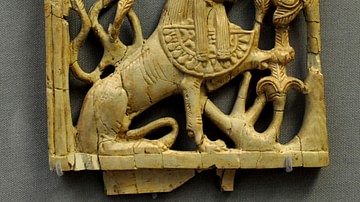
Image
Phoenician Ivory Sphinx Plaque
This ivory plaque is part of the so-called "Nimrud Ivories." The sphinx wears the typical Egyptian Pharaohs' double crown and an apron with cobra. This indicates that the plaque was made by a Phoenician craftsman. From Nimrud (ancient Kalhu...
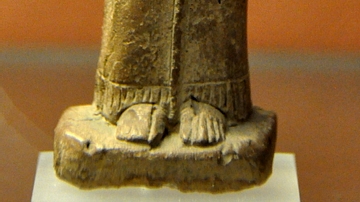
Image
Lahmu Statuette
Lahmu (also Lakhmu or Lache, which mean hairy) was a a son of Abzu and Tiamat. Lahmu was a minor protective and beneficent deity and was often associated with Ea, God of the sweet water and wisdom. From Nineveh (modern Ninawa Governorate...